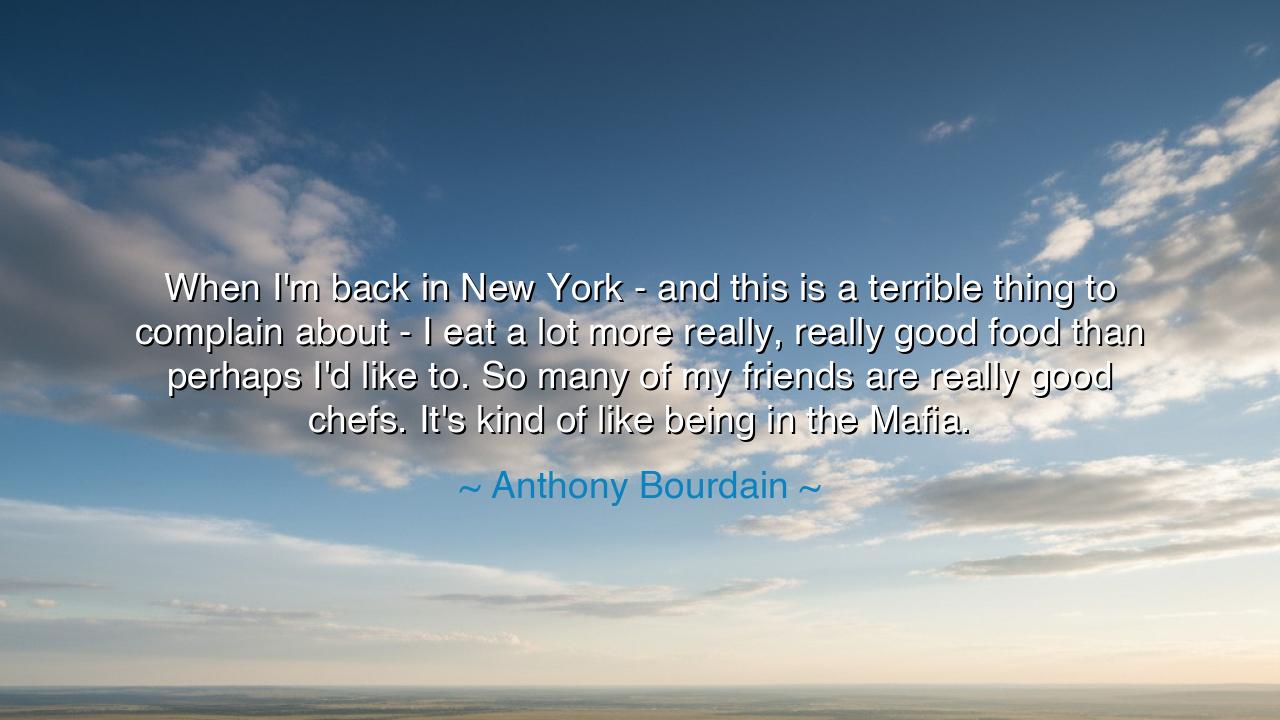
When I'm back in New York - and this is a terrible thing to
When I'm back in New York - and this is a terrible thing to complain about - I eat a lot more really, really good food than perhaps I'd like to. So many of my friends are really good chefs. It's kind of like being in the Mafia.






Host: The evening sky outside had deepened into a rich navy, the city lights below flickering like stars scattered across the dark canvas. Jack and Jeeny sat in the dim corner of a trendy little restaurant, the sound of clinking silverware and soft murmurs of conversation around them fading into the background. The rich smell of freshly baked bread and simmering sauces wafted through the air. Jack leaned back in his chair, eyes twinkling as he recounted a story from earlier in the day, while Jeeny listened with a small smile.
Jack: “You know, Anthony Bourdain’s quote about New York really resonates with me. He says it’s like being in the Mafia, surrounded by good food and friends who are amazing chefs. He calls it a terrible thing to complain about, but honestly, it’s such a strange kind of luxury—being constantly surrounded by some of the best food in the world.”
Jeeny: “It’s ironic, right? New York is this place of incredible wealth in terms of food culture, but it’s also so consuming. To be constantly surrounded by the best chefs, to have that level of access—it’s almost too much. I mean, food is one of the most personal things we experience, and in New York, it becomes almost like a status symbol, like being in the Mafia—where food is both a gift and a burden.”
Jack: “Yeah, exactly. And there’s this kind of pressure, right? Not just to eat great food, but to appreciate it, to know the difference between a perfectly seared steak and something that’s just fine. It’s almost like there’s this unspoken expectation to be in the know about food culture, about the trends, the chefs, the newest spots. It’s not enough to just eat; you have to experience it.”
Jeeny: “And isn’t that wild? That something as simple and essential as food becomes so loaded? Bourdain was always talking about how food unites people, but in New York, it’s almost like food is this currency, a way to show off not just your taste, but your connections. It’s like the Mafia—you’re not just eating to eat, but eating to prove something.”
Jack: “Exactly. And I think there’s this unwritten code too—like, if you’re in the know, you know where to go, what to eat, and with whom. It’s a community, but one that’s built on this elite knowledge of food. It’s fascinating, because for most people, food is a necessity, something to savor and enjoy in peace, but in places like New York, it becomes this performance.”
Jeeny: “But maybe that’s the beauty of it, Jack. Food is universal, but in New York, it becomes a form of art, an expression of creativity and culture. You don’t just eat there, you live food—taste it, talk about it, experience it in all its forms. Maybe it’s more than just eating to fill your stomach. Maybe it’s about connection—with the chefs, with the people, and with the history behind each dish.”
Jack: “You could be right. Bourdain always saw food as a way to connect people, to break down barriers. And in a way, that’s what happens in a place like New York, where everyone’s got their own take on food, where you can walk into a tiny hole-in-the-wall restaurant and be served something that’s unlike anything you’ve ever tasted before. There’s this sense that you’re not just eating, but you’re part of something bigger, part of a story.”
Jeeny: “And there’s humility in that, don’t you think? Despite all the prestige and the Mafia-like connections, Bourdain always made food about respect, about learning and appreciating the hard work that goes into creating something. It wasn’t about showing off—it was about understanding the culture and the passion behind the food.”
Host: The ambient sounds of the restaurant fade as the conversation between Jack and Jeeny deepens. Their words, much like the dishes around them, are carefully prepared, full of layers of meaning. The light from the candles flickers softly, casting a warm glow on the table. The room feels charged with the unspoken understanding that food, in all its complexity, is much more than sustenance—it’s a window into culture, connection, and even identity.
Jack: “So, in the end, it’s not about the food itself, but about how it connects us, right? About how something as simple as a meal can become a way of living, of sharing, and of understanding the world around us.”
Jeeny: “Exactly. Food has the power to bridge gaps, to connect us to places, people, and stories. It’s more than just eating; it’s about living fully, appreciating the art of it, and understanding the culture behind every bite.”
Host: As their conversation winds down, the room feels richer, as though they’ve just tasted something profound. The world outside continues its dance of light and shadow, but inside, the connection made over food and understanding lingers like the warmth of a well-prepared meal.






AAdministratorAdministrator
Welcome, honored guests. Please leave a comment, we will respond soon